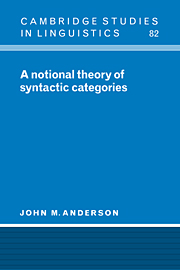3 - The syntax of categories
Published online by Cambridge University Press: 14 August 2009
Summary
By now he suspected his own syntax, but Arthur would not notice syntax.
The preceding chapter was concerned with establishing a scheme of notionally based categories. This categorisation forms the basis for the selection of word classes made in particular languages, and it determines the basic distribution of these word classes. This chapter is concerned to make more explicit in detail how syntactic structure is erected on the basis of these categories. Thus, part of our concern will be with the subcategories we can associate with the various categories of chapter 2, subcategories which further define the distributional potential of items belonging to a particular category. It should already be clear that these subcategories are not simply to be equated with the traditional secondary categories (Tense, Gender etc.) as such. In §2.7 (in particular) I reinterpreted the traditional secondary categories as manifesting configurations elsewhere expressed syntactically (as periphrases); in the central cases they are partial morphologisations of types of the functional categories { }, {P}, {P.N} and (particularly) {N}. When one of these categories governs a lexical category, the valencies (complement-requirements) of the types of functional category involved impose subcategorisation on that category, as with the classifier or Gender {N} governing nouns; but also the valency requirements themselves subcategorise the governing {N}. Both value and valency are, in this sense, subcategorisational. And these are the subcategories with which we are concerned here.
Information
- Type
- Chapter
- Information
- A Notional Theory of Syntactic Categories , pp. 146 - 319Publisher: Cambridge University PressPrint publication year: 1997
